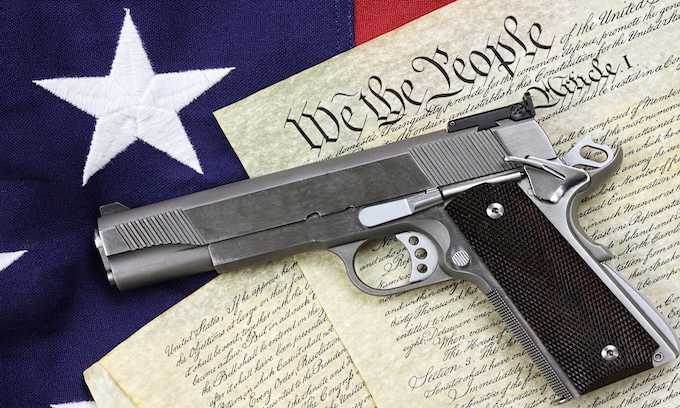On February 14, President Biden marked the third anniversary of the deadly shooting incident at Marjory Stoneman Douglas High School in Parkland, Florida, with an announcement that he is calling on Congress to enact “commonsense gun law reforms.”
As always, the details matter. The president defined “commonsense” as a requirement for background checks on all gun sales, a ban on “assault weapons and high-capacity magazines,” and an end to “immunity for gun manufacturers who knowingly put weapons of war on our streets.”
The U.S. Supreme Court held in 2008, in the District of Columbia v. Heller decision, that the Second Amendment right to “keep and bear arms” is an individual right that is not contingent on service in “a well-regulated militia.” That means the U.S. Constitution limits the federal government’s power to pass laws restricting that right.
Exactly where are the limits? That’s always a matter of interpretation. The Heller opinion, written by the late Associate Justice Antonin Scalia, held that the District’s law prohibiting the possession of handguns was over the line, as was its law requiring residents to keep their lawfully owned, registered long guns “unloaded and dissembled or bound by a trigger lock or similar device” unless the guns were located in a place of business or in use for lawful recreational activities.
Scalia wrote that the handgun ban “amounts to a prohibition of an entire class of ‘arms’ that is overwhelmingly chosen by American society” for the “lawful purpose” of “the inherent right of self-defense.” Under any standard that the court has used, he wrote, “banning from the home ‘the most preferred firearm in the nation to keep and use for protection of one’s home and family,’ would fail constitutional muster.”
So if the president’s definition of “assault weapon” and “weapons of war” includes commonly owned firearms and magazines, it’s likely that new laws banning these or seeking to create new legal liability for their manufacturers will be found unconstitutional by the U.S. Supreme Court, should these laws be challenged.
And there’s no doubt that such laws would be challenged. After Biden’s statement was released, the Firearms Policy Coalition responded, denouncing what it called “unconstitutional and immoral policies including bans on common semi-automatic firearms and ammunition magazines.” A number of lawsuits over various state laws related to firearms ownership are already working their way toward the high court.
The Heller decision was 5-4, with Justices John Paul Stevens, David Souter, Ruth Bader Ginsburg and Steven Breyer in the minority.
Former President Donald Trump campaigned as a staunch defender of Second Amendment rights, and it would not be surprising, to say the least, if the three justices he appointed to the high court share that view to some extent. Associate Justices Neil Gorsuch, Brett Kavanaugh and Amy Coney Barrett likely have created a solid majority to strike down broad bans on semiautomatic weapons and laws that flatly prohibit law-abiding citizens from exercising the right to carry a gun. In Scalia’s words, “the enshrinement of constitutional rights necessarily takes certain policy choices off the table.”
That won’t stop the Democratic majorities in Congress, together with the president, from enacting doomed laws, or from sending fundraising letters attacking their opponents. It’s always about the next election. It remains a fact that constitutional rights cannot be overridden by a majority vote, except on the Supreme Court.
___
(c)2021 The Orange County Register (Santa Ana, Calif.)
Visit The Orange County Register (Santa Ana, Calif.) at www.ocregister.com
Distributed by Tribune Content Agency, LLC.
—-
This content is published through a licensing agreement with Acquire Media using its NewsEdge technology.



















“Marjory Stoneman Douglas High School in Parkland, Florida,” isn’t that the place where hogg spawn crawled out of? If I remember correctly, this is the school system that had a MOU with the obama admin to “have fewer minority students charged, because it looked bad,” isn’t this is the school where the sheriffs department was not supposed to arrest or charge the students, this is the school where the sheriffs department had OVER 37 CONTACTS WITH THE SHOOTER, INCLUDING SEVERAL THAT, IF HANDLED CORRECTLY, WOULD HAVE CAUSED THE SHOOTER TO BE DENIED THE ABILITY TO PURCHASE A GUN. Isn’t the shooter the same one who had been turned into the FBI, twice, by students, as a person most likely to be a school shooter and the said FBI ignored it? Isn’t this the shooter whose OWN mother had turned him in for violence at home? I think this is the place, can we all spell “FALSE FLAG” a setup, to push the “gun grab” not control narrative of the communist/democrat party? Now the bad news is, sadly, the communist/democrat party is in control with Captain Dementia at the helm and I strongly fear for the lives of innocents, because there WILL BE ANOTHER FALSE FLAG MASS SHOOTING EVENT IN THE NEAR FUTURE, the commies must push their agenda, and this is what they do best, lie, cheat and steal.
You nailed it, except I think you would be better served using the word Fascist, as none of the wealthy in our nation will ever give up their wealth. They have no desire for Socialism or Communism, the word Socialist is used as a cudgel of sorts, to manipulate policy and lure our idiot youth, that have been indoctrinated to think Socialism is a good thing.
Their design is clearly one more along the lines of an oligarchy, the basis of which they have already established over decades. We are all to be serfs, mere peasants in their kingdom, their rule, a birth right granted by their blood.
Considering todays environment with the likes of the little cockroaches antifa, my bet is, the majority of Americans could not define fascism if it bit them in the butt.
OR they fear if they DID define it, they’d get Targeted, for defining the “wrong group”.
The Democrats are known for creating problems to help push their agenda. It wouldn’t surprise me if the whole thing wasn’t a setup.
Hence why i keep wondering.. WE SAW NO mass shootings all last year.. I wonder when the inevitable ‘triggered’ one happens THIS year, to spur on yet MORE ANTI GUN protests, just as they’re trying to shove this down our throats.
Common sense would entail a realization that criminals do bad things and not set out to punish the good guys. But then I’ve never known a Democrat with common sense.
Good guys don’t need gun laws.
Bad guys don’t heed gun laws.
IT was all cause of OBAMA’s bull spit rules, that CAUSED this guy to go ‘un punished’, which led to him getting the gun(s) he used in this shooting….
You are spot on, yet LAW ABIDING CITIZENS get the blame.
Its like the military.. Any time some dumb butt, did a DUI, we’d have a command standdown, punishing ALL for that one (or sometimes 3) person’s mistake..
The communist left, disarming citizens so the citizen cannot protect themselves, from people like antifa and blm, which are the darlings of the left.
The Socialist Democrat Party “Gun Control” is ALL ABOUT CONTROL.
Control of the people,
prevent opposition to the tyranny “Socialist Democrat Party”.
When was the last time you heard ANY politician mention or condemn:
I.A.W. U.S. Census & FBI (Table 43a) Black males make up about 8% of the U.S. population but commit 53% of all the murders and 55% of all robberies in the U.S… Every year there are ~6,000 African-Americans men, women and children killed and 94% of them were killed by fellow African-Americans.
Where is the outrage from the Democrat Party or prominent members of the African-American community?
AND YOU know any law they DO put into place, wouldn’t EVER APPLY TO antifa/BLM or the black/asian/latino ran gangs.
It’s now official, in order to be a Democratic POTUS you must be on the verge of dementia and be a graduate in the bottom half of your law school
Or in the case of Colorado, state government has to be sexually confused unable to pass the gender identification chart exam
It is NOT street criminals, nor even foreign invaders that we were endowed by our creator with the unalienable Right, protected by the 2nd Amendment, to keep and bear arms. It was solely out into pace as an assurance against our government assuming to much power and becoming a tyrannical dictatorship.
In other words, to prevent exactly what we are seeing now, have been seeing for many decades!
There is, of course, a codicil to all of our Rights that was never entered into the Declaration of Independence, the Constitution or the Bill of Rights, as I would suppose the founding father’s never imagined it would of issue. That being, if We The People become so complacent and take our liberty and freedom so much for granted, that our Rights are able to be slowly removed, as has been the case for decades and then, having neither the courage, nor will to fight to restore and maintain said Rights.
Could it be that, at this point, we feel we have to much to loose? Ask yourself, what did Washington risk for us, likewise all who fought in the Revolutionary War, as did one of my great grandfathers, they all risked their lives, their fortunes and their honor, do We The People have no honor left to risk? These are dire times indeed, must they also be times of shame?
Two major parts of the Constitution stand in the way of Biden and his gun control agenda. Article One, Section One prohibits Executive Orders (look it up) and the Second Amendment states that “the right of the people to keep and bear arms shall not be infringed.”
Today’s liberals are the remnants of the Tories, from colonial days, who preferred the “safety” of loyalty to the central national leadership (king) to the freedom provided by the Declaration of Independence and the US Constitution. These people have proven themselves unworthy of living in America or of having citizenship here. Thus they should be on the very next one-way journey to another nation; never to return.
EVER President, has used EO’s…
AND our rights are ALREADY infringed.. To the tune of 400 + Anti-gun laws already existing.